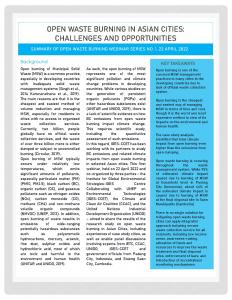This brief summarises the proceedings and outcomes of the webinar on open waste burning held on 22nd April 2022, co-organized by three parties– the Institute for Global Environmental Strategies-IGES Centre Collaborating with UNEP on Environmental Technologies (IGES-CCET), the Climate and Clean Air Coalition (CCAC), and the United Nations Industrial Development Organization (UNIDO) –aimed to share the results of the research study on open waste burning in Asian Cities, including experiences of case study cities, as well as enable panel discussions involving experts from IETC, CCAC, UNIDO, IGES-CCET, and government officials from Padang City, Indonesia, and Stueng Saen City, Cambodia.
The key takeaways from the webinar are:
Open burning is one of the common MSW management practices in many cities in the developing countries due to lack of official waste collection system. Open burning is the cheapest and easiest way of managing MSW in terms of time and cost, though it is the worst and most expensive method in view of its impacts on the environment and human health.
The case study analysis identified that total climate impact from open burning even higher than the emissions from open dumping.
Open waste burning is occurring throughout the waste management system. While 95% of estimated climate impact caused due to the the burning of MSW at the household level in Padang City (Indonesia), about 44% of the estimated climate impact is caused due to burning of MSW at the final disposal site in Saen Municipality (Cambodia)
There is no single solution for mitigating open waste burning, cities can apply integrated approach including secure waste collection service for all residents, including low income areas, awareness-raising, allocation of funds and resources to improve the waste treatment and final disposal sites, enforcement of laws, and introduction of decentralised monitoring mechanisms.

